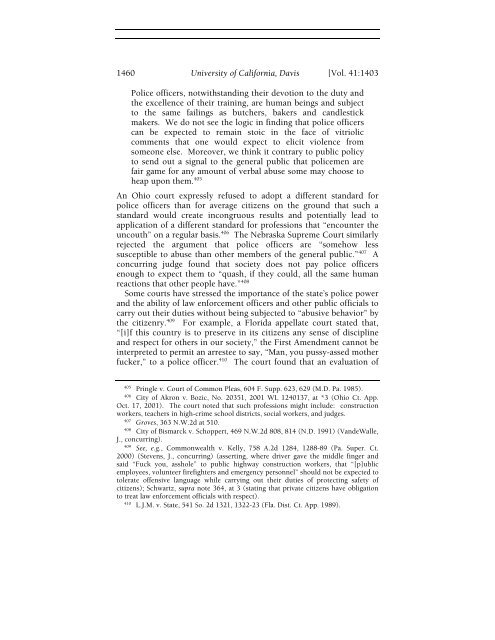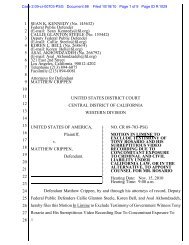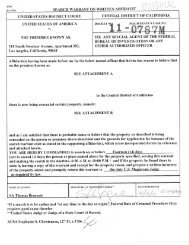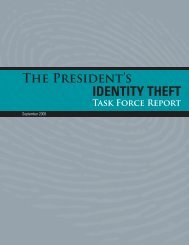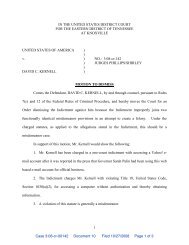Digitus Impudicus: The Middle Finger and the Law - Wired
Digitus Impudicus: The Middle Finger and the Law - Wired
Digitus Impudicus: The Middle Finger and the Law - Wired
Create successful ePaper yourself
Turn your PDF publications into a flip-book with our unique Google optimized e-Paper software.
1460 University of California, Davis [Vol. 41:1403<br />
Police officers, notwithst<strong>and</strong>ing <strong>the</strong>ir devotion to <strong>the</strong> duty <strong>and</strong><br />
<strong>the</strong> excellence of <strong>the</strong>ir training, are human beings <strong>and</strong> subject<br />
to <strong>the</strong> same failings as butchers, bakers <strong>and</strong> c<strong>and</strong>lestick<br />
makers. We do not see <strong>the</strong> logic in finding that police officers<br />
can be expected to remain stoic in <strong>the</strong> face of vitriolic<br />
comments that one would expect to elicit violence from<br />
someone else. Moreover, we think it contrary to public policy<br />
to send out a signal to <strong>the</strong> general public that policemen are<br />
fair game for any amount of verbal abuse some may choose to<br />
heap upon <strong>the</strong>m. 405<br />
An Ohio court expressly refused to adopt a different st<strong>and</strong>ard for<br />
police officers than for average citizens on <strong>the</strong> ground that such a<br />
st<strong>and</strong>ard would create incongruous results <strong>and</strong> potentially lead to<br />
application of a different st<strong>and</strong>ard for professions that “encounter <strong>the</strong><br />
uncouth” on a regular basis. 406 <strong>The</strong> Nebraska Supreme Court similarly<br />
rejected <strong>the</strong> argument that police officers are “somehow less<br />
susceptible to abuse than o<strong>the</strong>r members of <strong>the</strong> general public.” 407 A<br />
concurring judge found that society does not pay police officers<br />
enough to expect <strong>the</strong>m to “quash, if <strong>the</strong>y could, all <strong>the</strong> same human<br />
reactions that o<strong>the</strong>r people have.” 408<br />
Some courts have stressed <strong>the</strong> importance of <strong>the</strong> state’s police power<br />
<strong>and</strong> <strong>the</strong> ability of law enforcement officers <strong>and</strong> o<strong>the</strong>r public officials to<br />
carry out <strong>the</strong>ir duties without being subjected to “abusive behavior” by<br />
<strong>the</strong> citizenry. 409 For example, a Florida appellate court stated that,<br />
“[i]f this country is to preserve in its citizens any sense of discipline<br />
<strong>and</strong> respect for o<strong>the</strong>rs in our society,” <strong>the</strong> First Amendment cannot be<br />
interpreted to permit an arrestee to say, “Man, you pussy-assed mo<strong>the</strong>r<br />
fucker,” to a police officer. 410 <strong>The</strong> court found that an evaluation of<br />
405 Pringle v. Court of Common Pleas, 604 F. Supp. 623, 629 (M.D. Pa. 1985).<br />
406 City of Akron v. Bozic, No. 20351, 2001 WL 1240137, at *3 (Ohio Ct. App.<br />
Oct. 17, 2001). <strong>The</strong> court noted that such professions might include: construction<br />
workers, teachers in high-crime school districts, social workers, <strong>and</strong> judges.<br />
407 Groves, 363 N.W.2d at 510.<br />
408 City of Bismarck v. Schoppert, 469 N.W.2d 808, 814 (N.D. 1991) (V<strong>and</strong>eWalle,<br />
J., concurring).<br />
409 See, e.g., Commonwealth v. Kelly, 758 A.2d 1284, 1288-89 (Pa. Super. Ct.<br />
2000) (Stevens, J., concurring) (asserting, where driver gave <strong>the</strong> middle finger <strong>and</strong><br />
said “Fuck you, asshole” to public highway construction workers, that “[p]ublic<br />
employees, volunteer firefighters <strong>and</strong> emergency personnel” should not be expected to<br />
tolerate offensive language while carrying out <strong>the</strong>ir duties of protecting safety of<br />
citizens); Schwartz, supra note 364, at 3 (stating that private citizens have obligation<br />
to treat law enforcement officials with respect).<br />
410 L.J.M. v. State, 541 So. 2d 1321, 1322-23 (Fla. Dist. Ct. App. 1989).


